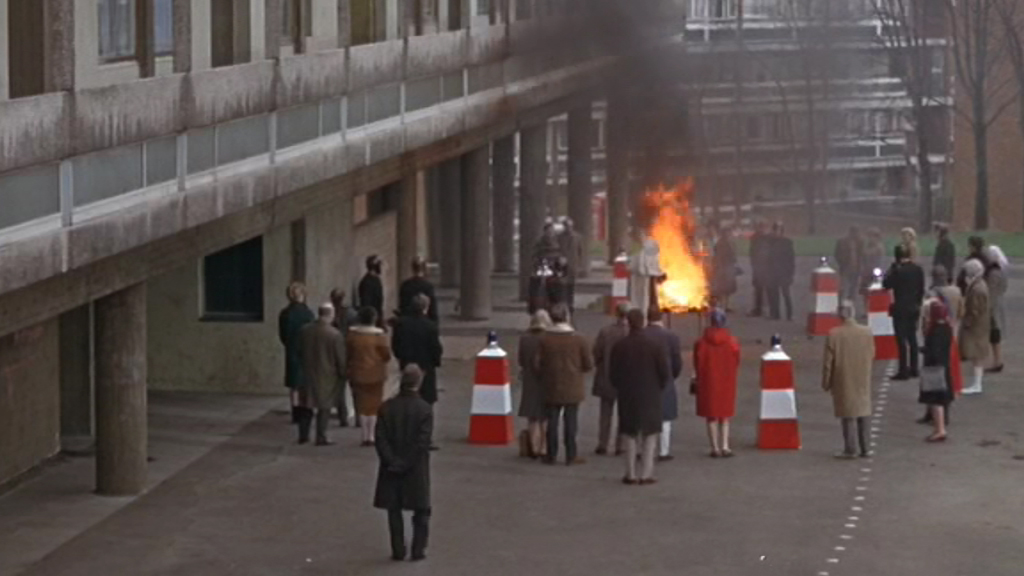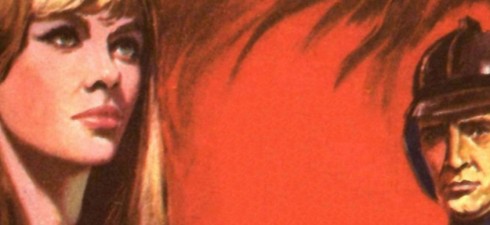Existentialism, beauty, truth, censorship — in Andy’s hands, Rogue Cinema was never about spending a few entertaining hours in the dark, it was about exploring life’s big questions through film. Rogue Cinema is going to go through some changes in the future, moving from a weekly column to a monthly post in Stacks, but we hope to keep Andy’s truth-seeking spirit. Here is one of my favorites from the archives.

Truffaut’s famous adaptation of the Ray Bradbury novel Fahrenheit 451 begins with a strange and stern voice-over against coloured close-ups of television aerials, in the place of credits. This innovative opening introduces us directly to the world of the film, where the futuristic regime has outlawed the printed word. Books are banned, and ‘firemen’ are charged with starting blazes, to throw the contraband books into them. Oskar Werner (Jules et Jim) plays Guy Montag, the fireman whom the film follows on a journey of self-discovery that simultaneously reveals to him the oppressive character of the state by which he is employed.
Scenes of book-burning don’t take long to appear on-screen. Five minutes into the film, Montag has donned a huge fire-proof suit, grabbed a flame-thrower and is torching a medium-sized pile of paperbacks on what looks like a cheap barbecue. A crowd stand by, as enthralled as we are at the weird spectacle. Later, as Montag’s incineration team bust in on a stately home containing a jackpot — a hidden library — the images of book-burning reach out to the audience even more. Titles of great and popular literature appear large on the screen, first as they are drenched in blue flammable liquid, and then as the flames consume them. We have time to experience at length our horror in the face of the individual and systematic destruction of a world’s repository of knowledge. The lady who occupied the house drops the match that ignites the library, and then falls backwards to allow herself to be consumed: ‘to die as [she has] lived’.
A primary mode of transport in the film provides a poignant symbol: a monorail whizzes along in a perfectly straight line, elevated from the earth on metal supports. It is on this monorail commute that Montag first meets Clarisse (Julie Christie), the woman whose questions first cause him to see the cracks in the facade. Later, as Montag flees the state, a counterpart symbol emerges in the twin lines of the railway — a mode of transport made obsolete by the regime, but persistent on the ground over which the film’s protagonist makes his journey to freedom.
 Montag finds his destination at the end of the railway line. A small, hidden society inhabit abandoned railway cars in the woods, undertaking the endless task of memorising the world’s great literature, and transmitting each onto the next generation as they age. The film closes with the men and women walking in the falling snow, reciting their books as they pass the steady, onlooking camera.
Montag finds his destination at the end of the railway line. A small, hidden society inhabit abandoned railway cars in the woods, undertaking the endless task of memorising the world’s great literature, and transmitting each onto the next generation as they age. The film closes with the men and women walking in the falling snow, reciting their books as they pass the steady, onlooking camera.
Earlier this week, Heidi introduced her post on ‘Stacks’ by reminding us that Fahrenheit 451 describes the nature of real regimes: societies of the past that have enforced the burning of both books and human beings. The spectre of the ideological effort to control thought hangs over all kinds of institutionally-sponsored censorship. If we live in a state or belong to an institution that encourages an insulated relationship with knowledge and experience, then we have a particularly dramatic opportunity for self-discovery: as does Montag in the film. This process — to go from an inherited world-view, to a self-attained one — must be undertaken by all people who aspire to an authentic state of being. However, the ‘easy target’ of a controlling regime or institution may mask the full distance of our journey. Montag’s escape only marks the beginning: and yet it is a hugely significant step. Once he arrives in the woods, he is surrounded by others who, like him, have chosen their narratives.
For most of us, there’s still a long way to go on the journey to authentic knowledge. Yet here we are, at the end of the abandoned railway line. Here we must choose from the ‘books’ of the greatest minds the world has ever known. Here we must warm each other from the elements — because we have to face the brisk winter wind. We have to build our own houses and teach our children – to come into contact with ideas, or with the earth — the substance of our humanity.
;

Read the novel a few years ago. Never seen the movie. Nice write-up. Makes me want to see it.
*spoilers*
I always liked the changes Truffaut made to the story. I am glad that Clarisse lives in the movie version. I always felt her off-stage death as one of the biggest flaws of the novel. A great article